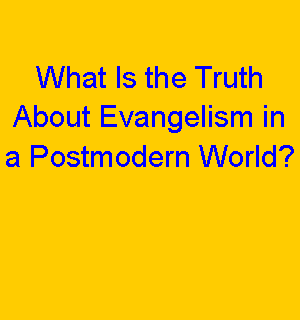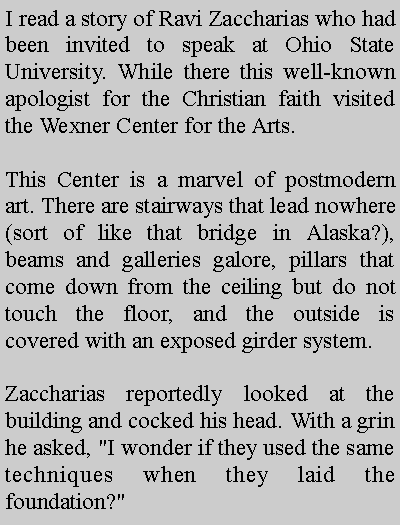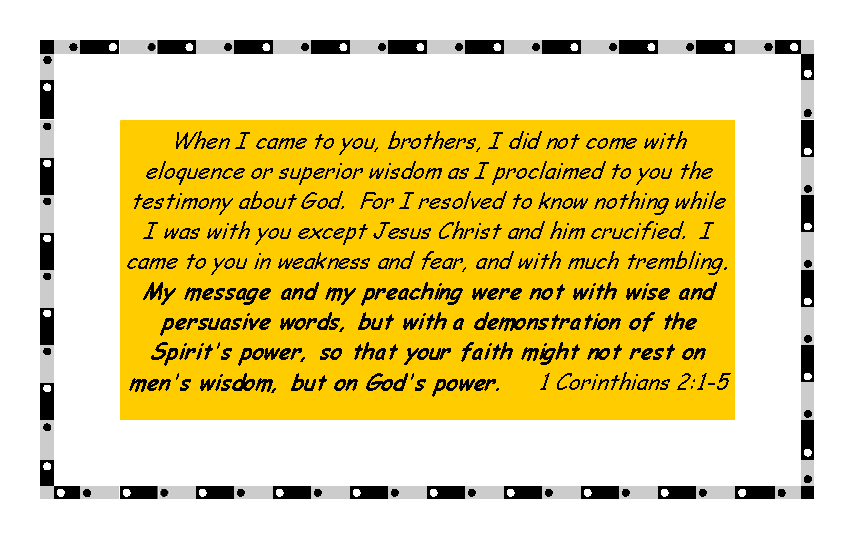|
Whether you realize it or not, we live in a postmodern world.† People, especially in the Western world, no longer accept absolute truth.† They no longer believe in authoritative view-points.† Each person has his own opinion, but no oneís opinion or view-point is considered universally correct.† This provides a great challenge for evangelism.† It is not easy sharing the Gospel in a postmodern society.† Just think about the popular television show known as ďThe View.Ē† The point of the show is that there are various views, and each person shares her view while the others listen and respond.† But is there such a thing as Godís View?† I believe there is, and I believe we need to share that view with the world. Why Itís Challenging to Evangelize in a Postmodern Context There are various reasons why it is hard to evangelize in a postmodern context, but I would like to mention two reasons.† First, postmodernism rejects metanarratives and absolute truth.† A metanarrative is a story that explains every other story.† It is a grand way of looking at the world as a whole and at where the world came from and where it is going.† Postmodernism says that there is no such thing as a metanarrative.† We canít view life and reality from an ultimate perspective.† All we can do is try to make sense of our own little lives and surroundings. But the Bible and the Gospel are based on the reality of a metanarrative.† That metanarrative is that God created this world, humanity then fell into sin, God sent his Son to be our Savior, and one day this world will climax with the return of Jesus and the overthrow of all evil.† You canít share the Gospel without sharing this metanarrative.† Thus, since postmodernism rejects metanarratives, there is an initial rejection to the Gospel because they donít believe that life can be explained in such a totalistic manner.† A second reason it is difficult evangelizing postmodern people is because of the assumption that all religions are equal.† Pluralism is a chief tenet of postmodernism.† Pluralism is the idea that no one religious path is superior to another.† Thus, it doesnít matter if you are a Christian or a Muslim or a Buddhist just as long as you are sincere and tolerant of other peopleís religion. Yet, Jesus Christ himself said, ďI am the way, the truth and the life; no one comes to the Father except through meĒ (John 14.6).† This is a bold, exclusivistic claim that cuts across the grain of postmodernism.† Jesus is not a way to God; He is the only way to God.† Because of this claim, evangelical Christians are viewed as narrow-minded and bigoted.† Yet, in reality we are just being faithfulófaithful to Jesus and to the Gospel.† We shouldnít be mean about it, but we also shouldnít deny the exclusivity of the Gospel.† There is still only one way to be saved, and that is through faith in Jesus Christ.† How to Evangelize in a Postmodern Context In one sense, we evangelize in a postmodern context the same way the church has always evangelized and that is by sharing the Gospel of Jesus Christ with lost people.† Pluralism has been around a long time.† It was present when the Apostles preached the Gospel in the ancient world.† It didnít keep them from saying that Jesus is the only way to be saved.† With that said, there are a few things that should be noted when thinking about how to effectively evangelize postmodern people. First, go on the offense and ask them to defend what they believe.† Postmodern people try to back Christians into a corner and demand that we defend our claims about Christ and the Bible.† But before we get intimidated, we need to remember that they need to defend their viewpoint as well.† Why do they believe it is wrong to rape a woman or molest a child?† Why do they believe we should be tolerant of other peopleís viewpoint?† Why do they believe anything?†† What is the basis of their beliefs?†† The postmodern has no answer. Well, they do have an answer, but it is not persuasive.† It is basically that society or the government determines what is right and wrong.† But what if society changed its view and said itís OK to hurt children?† Would it then be OK?† You see, postmodern people have moral values but they have no basis for these values.† In fact, their values often come from the Bible without them even knowing it.† As Christians, we do have a defense for what we believe and teach.† God has given us a Book, and in that Book he has told us what he is like, who we are, and how we can be saved.† That Book is called the Bible.† Second, share your story.† Share your testimony of how you became a Christian.† Stories are very important in postmodern society.† A story carries more weight than a propositional statement.† So we need to capitalize on this by sharing our story with them.† In the Book of Acts, the story of Paulís conversion is mentioned three different times (see Acts 9, 22, 26).† Paul saw value in sharing how he was converted and how his story could give others hope of being saved as well.† As one who struggled with drug addiction before getting saved, I have found it helpful to share y testimony with people.† The only problem is that some people look at you and say, ďThatís good that it worked for you, but itís not for me.Ē† This comes back to the idea that in postmodern thought no one way is correct or superior to others.† Thatís why we must not only share our story; we must share His story. This leads me to the third tip: share the story of Jesus Christ.† When Peter preached on the Day of Pentecost, he told the story of Jesus and how he came to save us (see Acts 2).† In that story, he emphasized his sinless life among us, his teaching and miracles, his substitutionary death, his bodily resurrection, his ascension, and his imminent return.† This story is the gospel of Jesus Christ.† We need to do more than invite people to church; we need to tell them the good news about Jesus Christ.† People are hurting and confused.† They have no moral compass in life.† What they need is hope and guidance.† What they need is a Savior who will liberate them from their sins and give them a real sense of purpose in life.† Jesus is that Savior.† Letís tell the postmodern world about him.†
|




